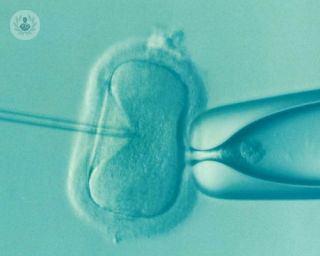Embryology
Mr Parijat Bhattacharjee - Obstetrics & gynaecology
Created on: 11-14-2013
Updated on: 06-06-2023
Edited by: Jay Staniland
What is embryology?
Embryology is the speciality that studies the formation and development of the embryo up until its birth. Its development begins with fertilisation, which leads to the formation of the zygote. Once the process in which the main structures and organs of the embryo are developed, the result is the foetus. The foetus appears during the first month.
Embryology provides different insights into the beginning of human life and the changes that occur during prenatal development. It is very useful to help understand the causes of variations in humans and it offers an understanding of normal development and malformations.

What is involved in embryology treatment?
Embryology recognises the majority of congenital disorders or malformations that the embryo may experience and order to correct them if possible and allow for normal development.
Some of the pathologies that can be detected during the embryo formation are:
- congenital diaphragmatic hernia
- bladder and cloacal exstrophy
- gastroschisis
- ectopia cordis
- capillary hemangiomas
- spina bifida
Embryology also helps to detect possible malformations in the foetus.
What are the subspecialties of embryology?
Teratology deals with the abnormal development of the foetus. This specialty is related to the various genetic or environmental factors that alter normal development and produce congenital effects.
Comparative embryology is responsible for comparing the embryos of living things, chemistry provides chemical bases for otogenic development and modern complements various disciplines such as medicine, genetics, and biochemistry.
Developmental biology is the part of embryology that studies the morphological changes that take place in the cells, tissues and organs from the germ cell of each parent to their successor, so it goes beyond the prenatal stage. And developmental physiology explains how the body works at these stages.
When should you see a embryology specialist?
When assisted reproduction is needed, for example, through the following methods:
- In vitro fertilization (IVF), meaning fertilisation outside of the body.
- Zygote intrafallopian transfer (ZIFT).
- Gamete intrafallopian transfer (GIFT).
It is recommended to see a medical specialist who specializes in embryology. You may also wish to see them if you're concerned your future child may suffer from a pathology or a malformation, for example.





